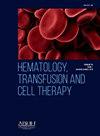Adverse effects of microparticles on transfusion of stored red blood cell concentrates
IF 1.8
Q3 HEMATOLOGY
引用次数: 0
Abstract
Background
Systemic and pulmonary coagulopathy and inflammation are important characteristics of transfusion-related acute lung injury (TRALI). Whether microparticles that accumulate in transfused red blood cell concentrates (RBCs) have proinflammatory and procoagulant potential and contribute to adverse reactions of RBC transfusions is unclear.
Aim
To investigate the ability of microparticles in stored RBCs to promote thrombin generation and induce human pulmonary microvascular endothelial cell (HMVEC) activation and damage.
Methods
The number and size of microparticles were determined by flow cytometric and nanoparticle tracking analyses, respectively. Thrombin generation and the intrinsic coagulation pathway were assayed by a calibrated automated thrombogram and by measuring activated partial thromboplastin time (aPTT), respectively. The expression of ICAM-1 and the release of cytokines by endothelial cells were detected by flow cytometric analyses. HMVEC damage was assessed by incubating lipopolysaccharide-activated endothelial cells with MP-primed polymorphonuclear neutrophils (PMNs).
Results
The size of the microparticles in the RBC supernatant was approximately 100–300 nm. Microparticles promoted thrombin generation in a dose-dependent manner and the aPTT was shortened. Depleting microparticles from the supernatant of RBCs stored for 35 days by either filtration or centrifugation significantly decreased the promotion of thrombin generation. The expression of ICAM-1 on HMVECs was increased significantly by incubation with isolated microparticles. Furthermore, microparticles induced the release of interleukin-6 (IL-6) and interleukin-8 (IL-8) from HMVECs. Microparticles induced lipopolysaccharide-activated HMVEC damage by priming PMNs, but this effect was prevented by inhibiting the PMNs respiratory burst with apocynin.
Conclusion
Microparticles in stored RBCs promote thrombin generation, HMVEC activation and damage which may be involved in TRALI development.
微粒子对输注储存的浓缩红细胞的不良影响。
背景:全身和肺凝血病变及炎症是输血相关急性肺损伤(TRALI)的重要特征。目的:研究储存的红细胞中的微颗粒促进凝血酶生成和诱导人肺部微血管内皮细胞(HMVEC)活化和损伤的能力:方法:分别用流式细胞仪和纳米颗粒追踪分析法测定微颗粒的数量和大小。凝血酶生成和内在凝血途径分别通过校准自动血栓图和活化部分凝血活酶时间(aPTT)进行检测。通过流式细胞分析检测内皮细胞的 ICAM-1 表达和细胞因子释放。通过将脂多糖激活的内皮细胞与MP诱导的多形核中性粒细胞(PMNs)孵育,评估了HMVEC的损伤:结果:RBC 上清液中的微颗粒大小约为 100-300 nm。微颗粒以剂量依赖的方式促进凝血酶的生成,并缩短 aPTT。通过过滤或离心将微颗粒从储存了35天的红细胞上清液中清除,可显著降低对凝血酶生成的促进作用。与分离出的微颗粒一起培养后,HMVECs 上 ICAM-1 的表达明显增加。此外,微颗粒诱导 HMVECs 释放白细胞介素-6(IL-6)和白细胞介素-8(IL-8)。微颗粒通过引诱PMN诱发脂多糖激活的HMVEC损伤,但用阿朴昔宁抑制PMN的呼吸爆发可阻止这种效应:结论:储存的红细胞中的微颗粒会促进凝血酶的生成、HMVEC 的活化和损伤,这可能与 TRALI 的发生有关。
本文章由计算机程序翻译,如有差异,请以英文原文为准。
求助全文
约1分钟内获得全文
求助全文
来源期刊

Hematology, Transfusion and Cell Therapy
Multiple-
CiteScore
2.40
自引率
4.80%
发文量
1419
审稿时长
30 weeks
 求助内容:
求助内容: 应助结果提醒方式:
应助结果提醒方式:


